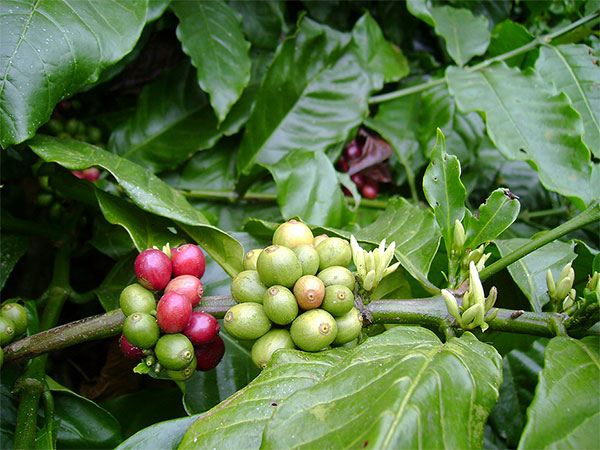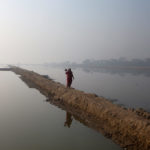Climate change affects coffee crops throughout the world, with extreme weather and virulent pests causing damage to yields and ruining the industry. Thus, kicking our addiction to fossil fuels will benefit coffee farmers as well as consumers.
As climate change worsens, coffee addicts may be in for a jolt
By Kirsten Daub, Published in The Georgia Straight
It’s another brilliantly sunny day in Northern Nicaragua. I’ve just clambered down a mountainside, and stepping into the shade of Manuel García’s coffee farm is instant relief from the heat. As we walk through the coffee trees, Manuel shows me where a beetle has bored through a coffee cherry’s fruit to the precious bean inside. “This one’s no good,” he says, and checks a nearby handmade insect trap. Manuel is a member of a co-operative in Nicaragua that supply Café Etico with fairly-traded, organic coffee. Over the past four years Café Etico has worked with farmers to increase organic farming capacity. Manuel is showing me his farm and the natural methods he uses to combat pests and diseases—a job that’s increasingly difficult due to unusual changes in local weather patterns.
Manuel’s experience is, unfortunately, all too common these days. Climate change has the potential to wipe out premium coffee crops around the world. While missing out on our morning cup of coffee may be the least of our worries as temperatures and sea levels rise, for those who actually grow the coffee we enjoy every morning, the impacts of climate change on coffee could not be more immediate and problematic.
In Central America, where the majority of Café Etico’s coffee originates, more than 500,000 small-scale farmers and another 2.1 million workers rely on coffee for their livelihood, with coffee exports representing a significant portion of many Central American countries’ export earnings. Coffee is already a very volatile crop in terms of prices paid to producers, and climate change is only going to make an already unstable crop all the more risky for many reasons.
STORY: Uganda: Coffee Farmers Sing Delicious Peace


Climate change is threatening coffee crops in virtually every major coffee producing region of the world. Higher temperatures, long droughts punctuated by intense rainfall, more resilient pests and plant diseases—all associated with climate change—have reduced coffee supplies dramatically in recent years. — Union of Concerned Scientists
Rises in temperature
Coffee is a finicky crop that requires specific temperatures and climatic conditions to thrive. In particular, high quality arabica coffee must be grown at a higher elevation (for cooler temperatures) than its lower-quality cousin, robusta, which can be grown in hotter climates (and lower elevations). As global temperatures increase, land where arabica is produced will become too hot for the crop to survive. Coffee often represents a significant portion of a farming family’s household cash income. Farmers who could once produce high quality coffee will either have to grow lower quality and less lucrative robustas, or switch to other food crops or livestock.
Disease and pests
Coffee is relatively delicate plant and is susceptible to fungi and pests. Coffee rust, a fungus that affects coffee plants’ leaves, has traditionally been a problem mainly at lower elevations. However, with increases in temperatures, coffee rust has been creeping up the mountains and affecting farmers who previously haven’t had to deal with it. The International Coffee Organization estimates that approximately 50% of the premium coffee crop in Central America was affected by rust in 2013. This will worsen as temperatures rise.
Last year, the cooperatives in Nicaragua that supply Café Etico were particularly hard hit by coffee rust. Pests like coffee berry borers, which, as their name indicates, bore into coffee cherries and ruin the bean, increasingly plague higher elevation coffee. They require specialized treatments of natural pesticides in the case of organic coffee, or, in conventional production, a particularly harsh pesticide known to cause health problems in those who apply it.
Unpredictable weather
We’re all familiar with the increased prevalence of “extreme weather.” In 2005, members of the Campesino Committee of the Highlands, the farmers’ association that supplies Café Etico’s Guatemalan coffee, lost a significant portion of their crop because of Hurricane Stan and the resulting landslides. It happened again with Tropical Storm Agatha in 2010. Farmers say “once in a decade” storms are now hitting every couple of years.
Small-holders with limited land are particularly vulnerable to such calamities, as their entire crop can be wiped out by one extreme weather event. Even less catastrophic amounts of rain can cause soil erosion, fungi and root rot.
But just as problematic are the changes in regular weather patterns. Coffee plants’ ability to flower depends on a predictable dry season during and after the harvest, followed by the punctual arrival of winter rains. Too little rain, a late start to winter rains, or unseasonable rain during the dry season limits a plant’s ability to flower, leading to a reduced and lower quality crop. In 2014, our co-op partners in Nicaragua reported a very late start to the rainy season; at Café Etico we were on tenterhooks until we heard that the rains had arrived and the coffee had begun to flower. Too much rain at the wrong time can cause coffee leaves and cherries to drop from the branches which can transform a bumper crop to a loss as farmers watch helplessly. Rain extending into the previously-dry harvest season can also keep processed beans from drying from lack of sun, causing them to mold and spoil.
Loss of ecosystems
Most high quality arabica coffee grown at high altitudes is shade-grown, that is, grown under a canopy of trees. This type of coffee plantation provides habitats for birds, insects and other animals, and acts as a carbon sink. Robusta coffee, on the other hand, requires direct sunlight. If coffee farmers are forced to shift to robustas or other crops that require full sun, valuable ecosystems and carbon sinks will be lost.
Intensive full-sun coffee production is also hard on soil, leading to erosion and nutrient-exhaustion, making soil unable to produce coffee and other crops in the long run. Full-sun coffee production has increased exponentially over the past 20 years, meaning more deforested land and a reduction in carbon sinks. Coffee roasters, especially the industry’s big players, could potentially make a difference by shifting their purchasing to shade-grown coffee and investing in sustainable agriculture methods. Indeed, one could argue that the major importers have a responsibility to do so given that much of their profits come at the expense of this intensive, unsustainable method. As this shift will be more difficult as temperatures rise, change in the coffee industry’s buying habits is urgent.
Keeping our beans flowing
I’d be remiss if I didn’t point out that the global coffee trade also contributes to climate change. As one of the world’s most-traded commodities, exporting coffee from producer countries is dependent on the petroleum-based shipping industry. Even as we lament the possible loss of coffee, our society’s love affair with caffeine will only contribute to its demise. If we want to continue to enjoy our culturally sanctioned drug, we need a major systemic change and a shift from a petroleum-based economy. If not, coffee is surely not the only thing we will lose from our morning routine.
Updated 26 April 2024













Pingback: Uganda: Fair Trade Coffee Farmers Sing Delicious Peace - WilderUtopia